Natural Language Processing (NLP) engineers are at the forefront of developing systems that can understand and generate human language. They work on creating models and algorithms that enable machines to process and analyze large amounts of natural language data, making it possible for computers to interact with humans in a more intuitive way. Their work is crucial in applications like chatbots, voice assistants, and language translation services.
The skills required for an NLP engineer include a strong foundation in programming languages such as Python, a deep understanding of machine learning and statistical models, and familiarity with NLP libraries like NLTK and spaCy. Additionally, they need to have good problem-solving abilities and the capacity to work with large datasets.
Candidates can write these abilities in their resumes, but you can’t verify them without on-the-job Natural Language Processing Engineer skill tests.
In this post, we will explore 7 essential Natural Language Processing Engineer skills, 7 secondary skills and how to assess them so you can make informed hiring decisions.
Table of contents
7 fundamental Natural Language Processing Engineer skills and traits
The best skills for Natural Language Processing Engineers include Machine Learning, Statistical Analysis, Programming Proficiency, Natural Language Understanding, Data Modeling, Deep Learning and Text Preprocessing.
Let’s dive into the details by examining the 7 essential skills of a Natural Language Processing Engineer.
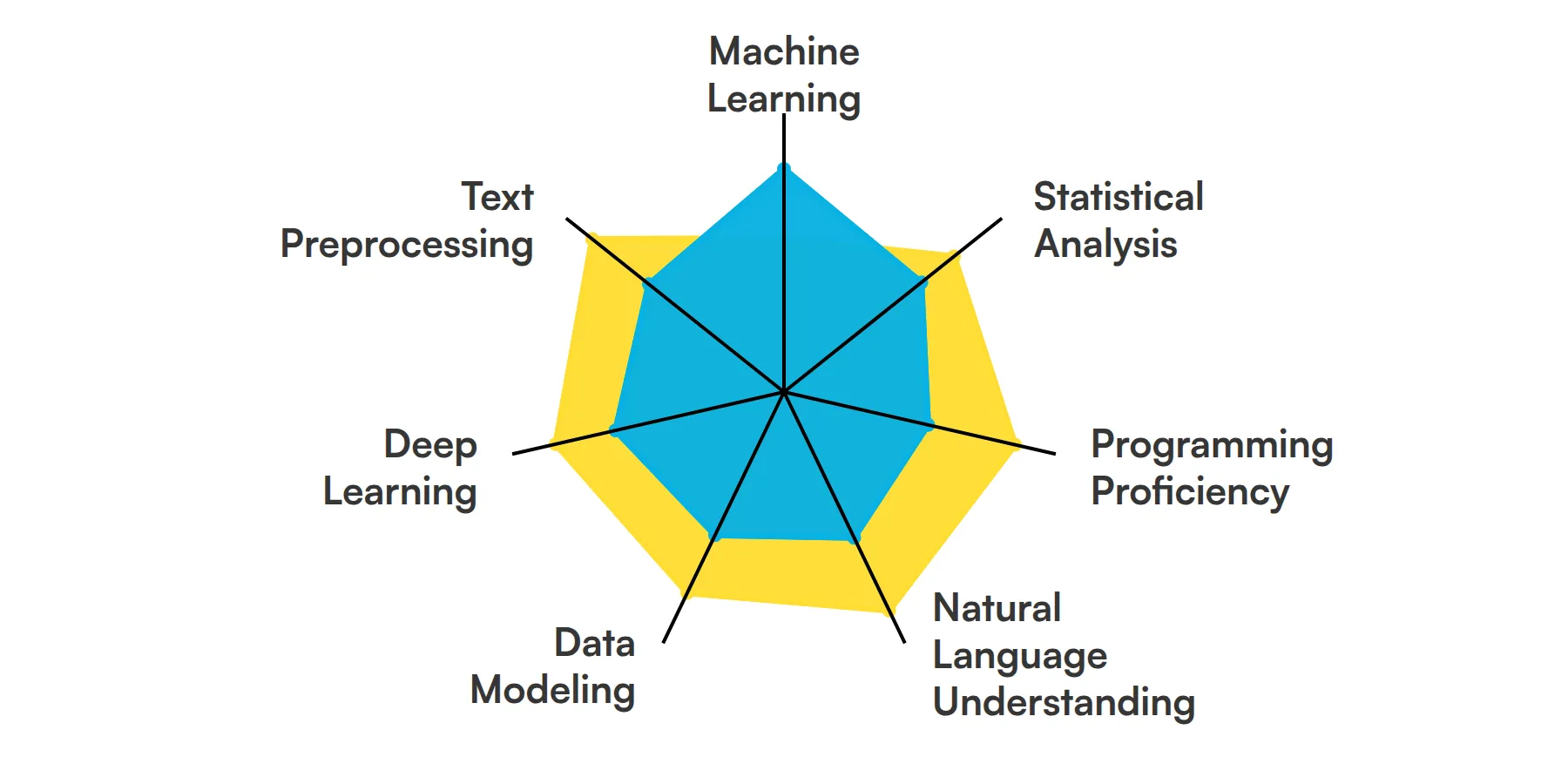
Machine Learning
A Natural Language Processing Engineer leverages machine learning algorithms to model and understand complex language data. This skill involves training models that can interpret, generate, and transform human language, making it a cornerstone in developing intelligent applications.
For more insights, check out our guide to writing a Machine Learning Engineer Job Description.
Statistical Analysis
Statistical analysis is critical for interpreting data trends and making predictions in NLP. This skill helps in understanding the underlying patterns in language data, essential for tasks like sentiment analysis and topic modeling.
Programming Proficiency
Proficiency in programming languages such as Python or Java is essential for implementing algorithms and managing data structures. The role of an NLP Engineer often involves scripting custom solutions and integrating APIs for language processing tasks.
Check out our guide for a comprehensive list of interview questions.
Natural Language Understanding
This skill involves the comprehension and interpretation of human language by machines. NLP Engineers use this skill to develop systems that can understand context, sarcasm, and nuances in text, crucial for applications like chatbots and virtual assistants.
Data Modeling
Data modeling in NLP involves creating models capable of processing and predicting linguistic patterns. This skill is used to structure and organize data in a way that supports efficient language processing and machine learning applications.
For more insights, check out our guide to writing a Data Modeler Job Description.
Deep Learning
Deep learning techniques are used to develop models that can automatically learn and improve from experience. NLP Engineers apply deep learning to solve complex language problems, such as speech recognition and machine translation.
Text Preprocessing
Text preprocessing is the method of cleaning and preparing text data for analysis. It includes tasks like tokenization, stemming, and removing stop words, which are fundamental for accurate model training and analysis in NLP projects.
Check out our guide for a comprehensive list of interview questions.
7 secondary Natural Language Processing Engineer skills and traits
The best skills for Natural Language Processing Engineers include Software Development, Cloud Computing, Version Control, Database Management, API Integration, Multilingual Processing and Ethical AI.
Let’s dive into the details by examining the 7 secondary skills of a Natural Language Processing Engineer.
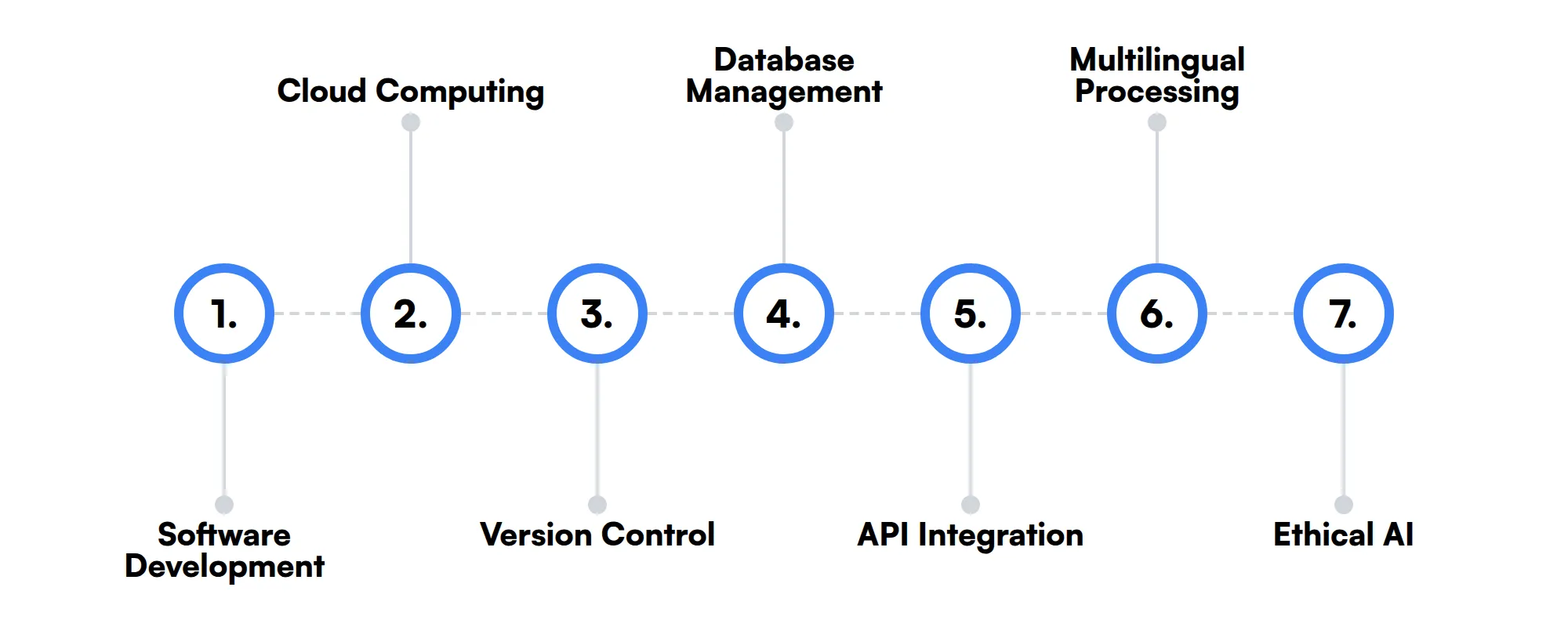
Software Development
Understanding software development practices is beneficial for integrating NLP technologies into applications and systems. This skill ensures that solutions are scalable, maintainable, and meet user requirements.
Cloud Computing
Familiarity with cloud services like AWS, Azure, or Google Cloud enables NLP Engineers to deploy scalable applications that handle large volumes of data and computational power.
Version Control
Using version control systems such as Git helps manage changes to project codebases, facilitating collaboration and tracking modifications over time.
Database Management
Skills in database management ensure that an NLP Engineer can efficiently store, retrieve, and manage data, which is crucial for performance and accessibility in NLP applications.
API Integration
Integrating various APIs allows NLP Engineers to enhance their applications with external services and data sources, broadening the functionality and reach of their projects.
Multilingual Processing
The ability to process and analyze text in multiple languages broadens the applicability of NLP solutions, making them more versatile and marketable.
Ethical AI
Understanding the ethical implications of AI and implementing practices that promote fairness and privacy is increasingly important as NLP technologies become more pervasive.
How to assess Natural Language Processing Engineer skills and traits
Assessing the skills and traits of a Natural Language Processing (NLP) Engineer can be a challenging task. NLP Engineers require a unique blend of technical expertise and analytical skills to effectively work with language data. While resumes can highlight educational backgrounds and past experiences, they often fall short in demonstrating a candidate's true capabilities in areas like machine learning, statistical analysis, and natural language understanding.
To truly understand a candidate's proficiency, it's important to use skills-based assessments that focus on real-world applications. These assessments can help you evaluate a candidate's programming proficiency, data modeling skills, and ability to preprocess text data. Adaface on-the-job skill tests are designed to provide insights into a candidate's competencies, offering a 2x improved quality of hires and an 85% reduction in screening time. By leveraging such assessments, you can ensure that you are selecting the right candidate for your NLP projects.
Let’s look at how to assess Natural Language Processing Engineer skills with these 6 talent assessments.
Machine Learning in AWS Online Test
Our Machine Learning in AWS Online Test evaluates a candidate's ability to apply machine learning techniques within the AWS environment, focusing on data science, data analysis, and the use of Python and its libraries.
The test assesses knowledge of AWS services for machine learning implementations, including data handling and programming skills.
Candidates who perform well demonstrate a strong grasp of machine learning concepts and effective use of AWS tools for data-driven solutions.
Statistics Test
Our Statistics Test measures a candidate's proficiency in statistical methods and data analysis, covering topics from probability to regression and non-parametric statistics.
This test evaluates understanding of statistical inference, data sampling techniques, and exploratory data analysis.
High-scoring individuals show a deep understanding of statistical theory and practical application in data analysis.
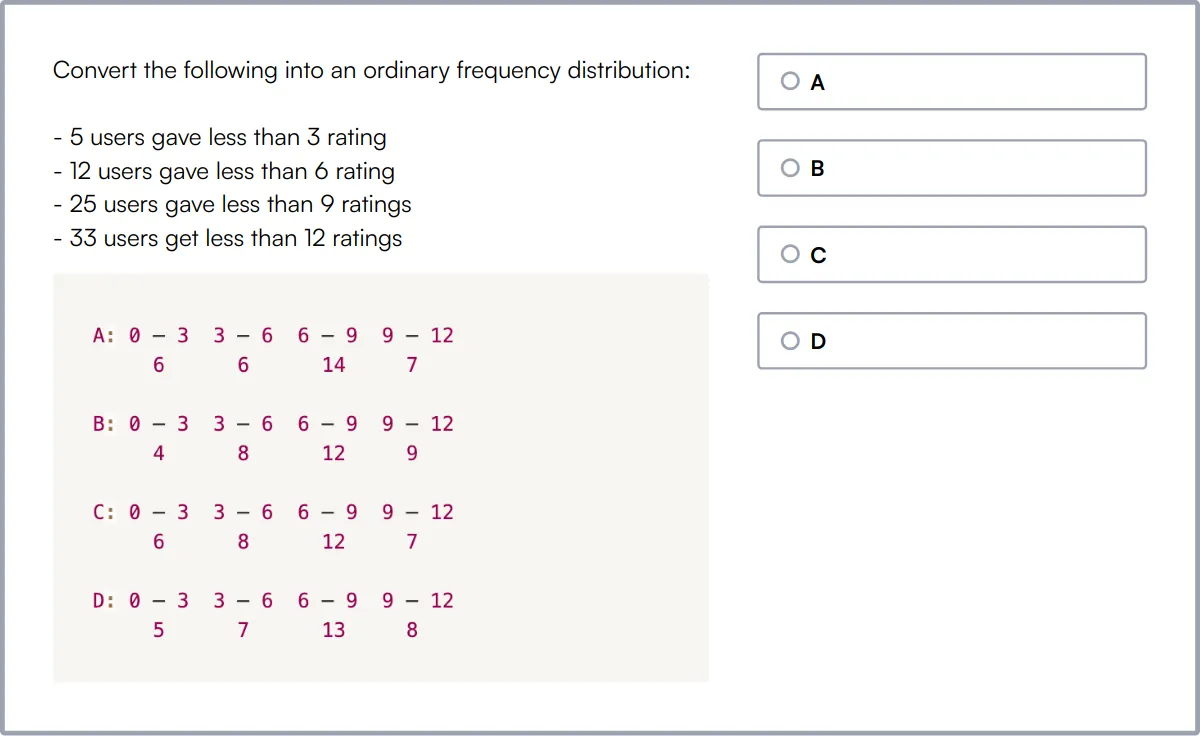
Basic Computer Skills Test
The Basic Computer Skills Test assesses fundamental computer skills, including data entry, Excel, and system administration.
Candidates are tested on their proficiency in handling basic data operations, system commands, and office software.
Successful candidates will demonstrate efficient handling of everyday computer tasks and basic administrative control.
Natural Language Processing (NLP) Test
Our Natural Language Processing (NLP) Test evaluates candidates on NLP techniques like text classification and sentiment analysis, crucial for handling real-world data.
The test challenges candidates with scenarios in tokenization, named entity recognition, and language modeling.
Candidates excelling in this test can effectively design and implement NLP models, demonstrating a strong grasp of both theoretical and practical aspects of NLP.
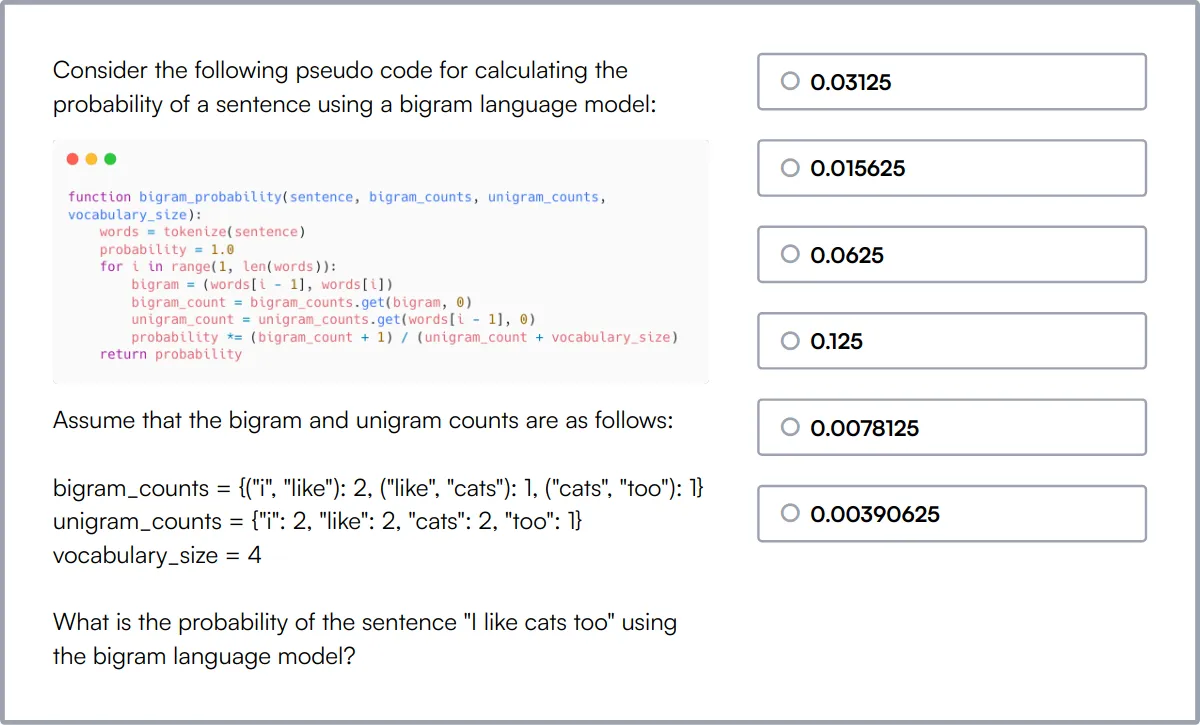
Data Modeling Skills Test
The Data Modeling Skills Test assesses a candidate's expertise in database design and data integrity, including SQL, ER diagrams, and normalization.
It evaluates the candidate's ability to create relational schemas, ensure data integrity, and perform data transformation.
Proficient candidates will display strong skills in structuring and managing data effectively, ensuring accuracy and utility in database systems.
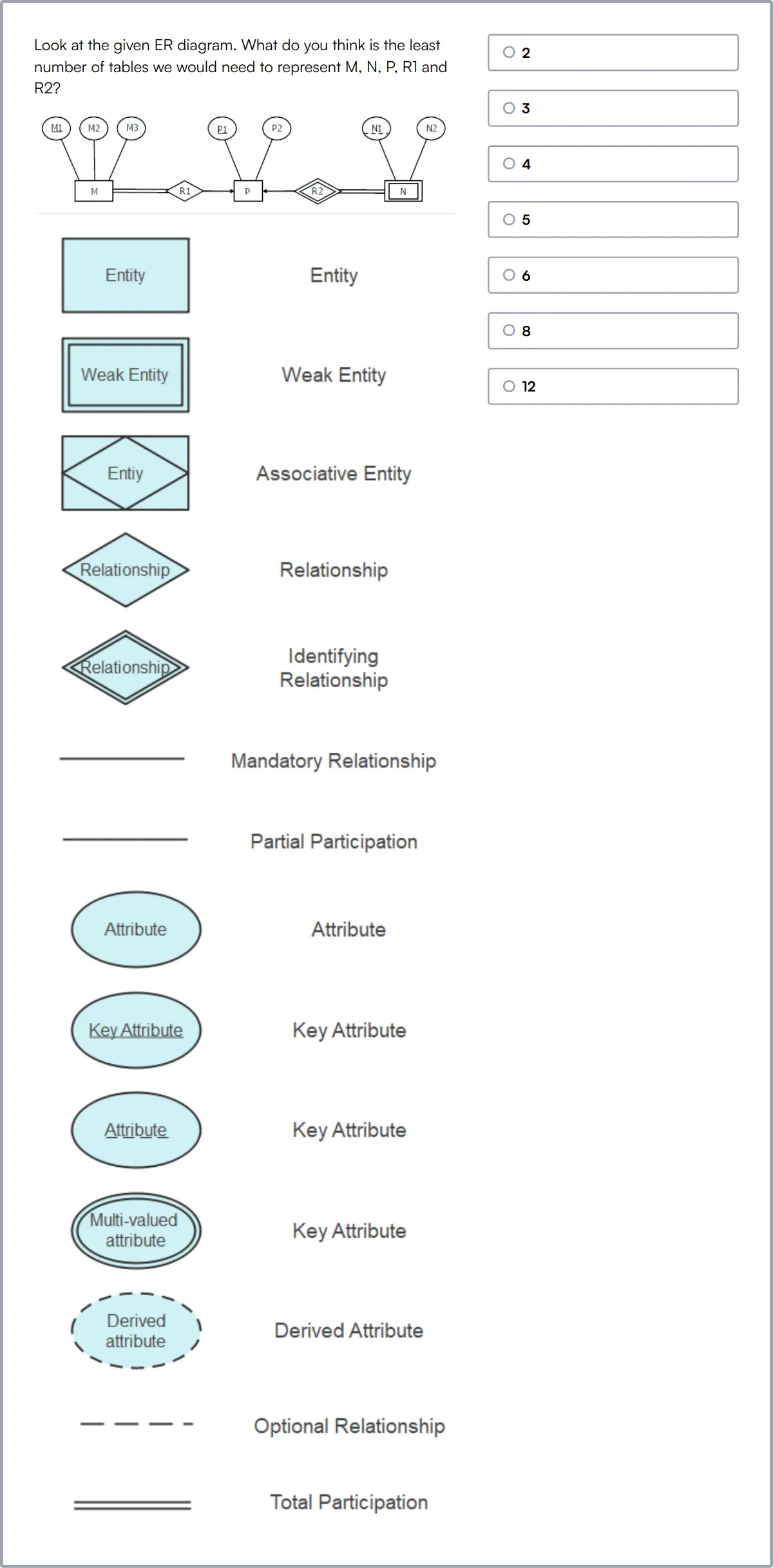
Deep Learning Online Test
Our Deep Learning Online Test probes into a candidate's understanding of deep learning frameworks, focusing on neural networks, CNNs, and RNNs.
This test assesses the application of deep learning to tasks like image recognition and text classification, involving core concepts such as backpropagation and activation functions.
Candidates who score well are adept at implementing advanced deep learning models and optimizing them for high performance on various tasks.
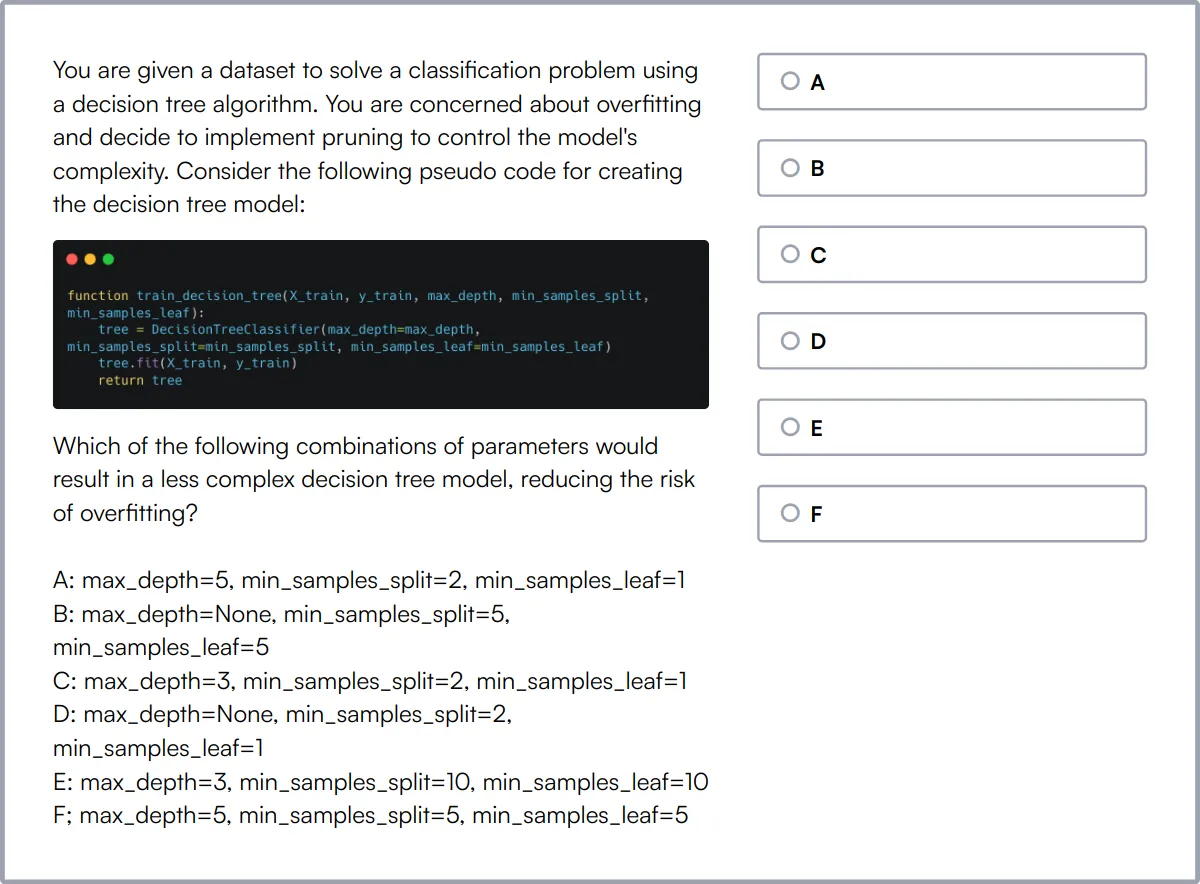
Summary: The 7 key Natural Language Processing Engineer skills and how to test for them
| Natural Language Processing Engineer skill | How to assess them |
|---|---|
| 1. Machine Learning | Evaluate a candidate's ability to design and implement learning algorithms. |
| 2. Statistical Analysis | Assess understanding and application of statistical theories in data analysis. |
| 3. Programming Proficiency | Test coding skills across various programming languages and paradigms. |
| 4. Natural Language Understanding | Check competence in processing and analyzing human language data. |
| 5. Data Modeling | Review ability to create accurate data models for analysis. |
| 6. Deep Learning | Examine expertise in constructing and training deep neural networks. |
| 7. Text Preprocessing | Assess skills in cleaning and preparing text data. |
Natural Language Processing (NLP) Test
Natural Language Processing Engineer skills FAQs
What programming languages should an NLP Engineer be proficient in?
NLP Engineers should be proficient in Python and Java. Python is widely used for its libraries like NLTK, SpaCy, and TensorFlow, while Java is often used in production environments.
How can recruiters assess an NLP Engineer's machine learning skills?
Recruiters can assess machine learning skills by evaluating candidates' experience with frameworks like TensorFlow or PyTorch, and their ability to explain concepts like supervised and unsupervised learning.
What is the importance of text preprocessing in NLP?
Text preprocessing is important for cleaning and preparing text data. It involves tasks like tokenization, stemming, and removing stop words, which improve the performance of NLP models.
How do NLP Engineers use cloud computing in their work?
NLP Engineers use cloud computing to scale their models and handle large datasets. Platforms like AWS, Google Cloud, and Azure provide tools for deploying and managing NLP applications.
Why is version control important for NLP Engineers?
Version control, using tools like Git, is important for tracking changes in code and collaborating with team members. It helps manage different versions of models and experiments.
What role does ethical AI play in NLP?
Ethical AI in NLP involves ensuring models are fair and unbiased. Engineers must consider the impact of their models on different demographics and work to mitigate any potential biases.
How can recruiters evaluate an NLP Engineer's database management skills?
Recruiters can evaluate database management skills by asking about experience with SQL and NoSQL databases, and how candidates handle data storage and retrieval for NLP tasks.
What is multilingual processing in NLP?
Multilingual processing involves developing models that can understand and generate text in multiple languages. It requires knowledge of language-specific nuances and translation techniques.

40 min skill tests.
No trick questions.
Accurate shortlisting.
We make it easy for you to find the best candidates in your pipeline with a 40 min skills test.
Try for freeRelated posts
Free resources



